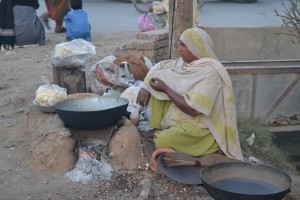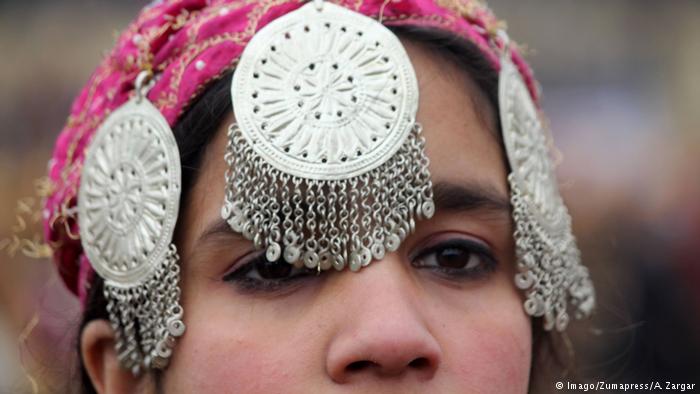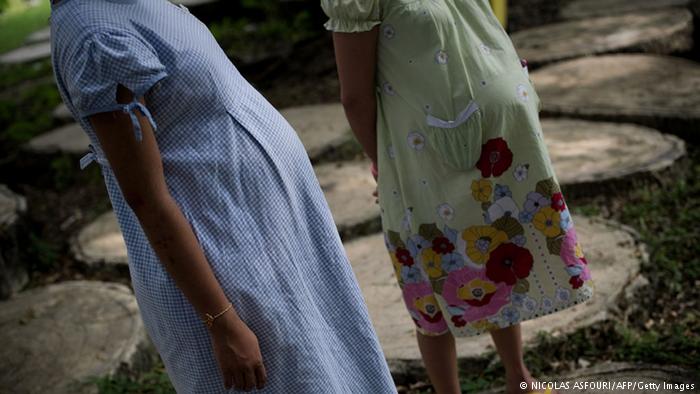Let us work with respect

This woman has set up a food cart in front of a government office in Lahore- by covering her face she says people will respect her.
As the nation mourned the killing of at least six female polio workers in the north-western and southern provinces, the Pakistani government celebrated its National Working Women’s Day on December 22. At least two women escaped target killing in the southern Punjab province a few days later. These women were being “punished” for a two-fold felony. Firstly, for immunising children against polio- what the extremists consider a CIA campaign to wipe-out Muslim children from the world- and secondly for working outside their homes.
Last week, more than 500 women polio workers demonstrated outside the parliament in Pakistan’s capital, Islamabad, to demand the regularisation of jobs and protection on duty. While they continue to put their lives at risk by administering anti-polio vaccine to the children, the government functionaries hide behind walls like little children who believe that if they are not seen while committing a mistake, they will not be caught.
In countries such as Pakistan, life is a constant struggle for a woman, especially those who work outside their homes. The drift in the philosophy of Pakistani women about other women is shockingly disorganized. Those who consider working women as social menace are a staggering majority, followed by those who wouldn’t mind a working sister-in-law or daughter-in-law, but would certainly be offended if she “starts taking her job too seriously”.
When one listens to frequent dialogues in a TV soap saying, “Never marry a working woman or one more educated than you” or a hears a friend, who works for women’s rights, tell you that her husband does not allow her to make independent decisions, one is forced to ponder: how far have we come away from our conservative mindsets? The answer is, not much.
Why celebrate the working women’s day when women are never realyl respected, except of course teachers, doctors and engineers- the only jobs considered respectable for women in Pakistan. What about cooks, washing women, receptionists, security guards, police women, drivers, actors, singers or saleswomen?
The problem is that instead of accepting women in diverse careers and acknowledging their role in development, the chauvinist society has started raising its voice against them. An example is a recent fatwa issued by a leading Indian Islamic seminary that advises women to refrain from working as receptionists, describing the job as un-Islamic and against the Sharia (Islamic law).

This woman sells roasted nuts and pop corns at a roadside stall in Lahore. She says she is the sole person who earns money in her family.
I am sorry, I am not a doctor or a teacher or an engineer. I am a journalist, whose job demands travelling and talking to people – lots of people, irrespective of whether I know them or not. I have to communicate with strangers, mostly men, from all parts of the country and abroad. The more the information, the better I can write. Why and how does that make me or anyone who does not adhere to her social or religious limitations a troublemaker?
Why is it that I am being appreciated for listening to songs in my mother tongue, but being silenced when I express my interest in singing?
Why am I told that as a Muslim woman I cannot travel alone without a legal male companion, while the men of my house are allowed to drink beer, smoke hashish and stay way from the house for as long as they want?
Why am I told that my career has complicated my mind, my once innocent, humble mind and that women must never be allowed to pursue careers so that the dormant activism in their heads, their humble, very compliant, female heads may never grow?
They might be censured for stepping out of their houses and interacting with strangers only so that they can provide themselves and their families a better life, but I believe offices and public places would function better with more and more women out there.
Author: Ayesha Hasan
Editor: Manasi Gopalakrishnan






